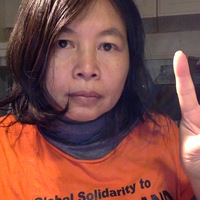
Pasit Wongngamdee
I am a researcher in Social Science. I got a Bachelor's Degree in Public, Politics, and Development Economics from Thammasat University, Thailand. Then I pursued my Master's Degree at Institute of Development Studies (IDS), University of Sussex, UK, with focus on Governance and Development. After my Master's Degree, I worked with Thailand Development Research Institute (TDRI) in a one-year project on Thailand's governance reform. After that, I worked as a Lecturer at the Faculty of Political Science, University of Ubonratchathani, Thailand. Then I took a leave to pursue my PhD at University of Canterbury, and was awarded a degree in Political Science and International Relations.
My PhD thesis title was "The Thai Military’s Political Education and Its Resistance: The Case of the Reserve Officer Training Corps Programme (หลกั สูตรรักษาดนิ แดน) 2014-2023". It explores the Thai military's political indoctrination in the Thai ROTC programme, and how those involved in the programme resisted the indoctrination. The thesis shed light on the contestation between the military's established hegemony and counter-hegemonic ideologies prevalent among the youth and soldiers between 2014 and 2023.
My research interests are various, but largely centering around the roles of morality and ideologies in politics, conflict, and violence, especially in Thailand and Southeast Asia. Other areas of interest include political culture, democratisation, nationalism, civic education, civil-military relations, and development discourse.
Supervisors: James Ockey
My PhD thesis title was "The Thai Military’s Political Education and Its Resistance: The Case of the Reserve Officer Training Corps Programme (หลกั สูตรรักษาดนิ แดน) 2014-2023". It explores the Thai military's political indoctrination in the Thai ROTC programme, and how those involved in the programme resisted the indoctrination. The thesis shed light on the contestation between the military's established hegemony and counter-hegemonic ideologies prevalent among the youth and soldiers between 2014 and 2023.
My research interests are various, but largely centering around the roles of morality and ideologies in politics, conflict, and violence, especially in Thailand and Southeast Asia. Other areas of interest include political culture, democratisation, nationalism, civic education, civil-military relations, and development discourse.
Supervisors: James Ockey
less
Related Authors
Charles David Crumpton
University of Maryland, College Park
Charles David Crumpton
University of Maryland, College Park
Janjira Sombatpoonsiri
Thammasat University
Puangthong R. Pawakapan
Chulalongkorn University
Puangthong R. Pawakapan
Chulalongkorn University
Koompong Noobanjong
King Mongkut's Institute of Technology Ladkrabang (KMITL)
Anthika Manowong
National Sun Yat-sen University
Paul Chambers
Naresuan University
InterestsView All (16)










Uploads
Papers by Pasit Wongngamdee
Book Reviews by Pasit Wongngamdee
Although the list of books and journal articles cited in Infiltrating Society is rather limited, Puangthong instead provides readers with a long list of archives, government reports, military orders, and newspaper clippings. Online evidence including websites, video clips, and social media posts and pages are referred extensively in the book as well. These informal sources, although potentially ‘less academic’ in the eyes of some scholars, help the readers to see what is actually happening on the ground. This evidence is quite useful considering that the nature of the military’s infiltrations often elude public attention. The difficulties which forced Puangthong to use such informal sources also reflect that further research on the military’s infiltrations is welcome.
Thesis Chapters by Pasit Wongngamdee
The thesis examines whether the ROTC programme succeeds in getting Thai civilians to accept the military’s political involvement or not. The thesis has three primary questions: (a) how has the Thai military indoctrinated ROTC students to accept the military’s involvement in politics? (b) how has such indoctrination been resisted by those involved in the ROTC programme? and (c) how effective has such indoctrination been? The main research method employed by the thesis was unstructured in-depth interviews with ROTC students, ROTC advisers, and military personnel.
The thesis found that the programme teaches ROTC students to accept the military’s role in both warfare and politics. For the military’s role in warfare, the programme encourages students to have a masculine-warrior character. This includes physical and mental strength, as well as being disciplined, obedient, patriotic, and loyal to the monarchy. Regarding the military’s political role, the programme teaches students that it is natural for the military to be involved in internal security, public policy, leadership selection, and determination of political order.
However, the thesis also found that ROTC indoctrination has faced widespread resistance from those involved in the programme: ROTC students, ROTC instructors, and ROTC advisers. These resisters cannot openly resist ROTC indoctrination, but when they are beyond the observation of the military, they seek to form an informal alliance with other resisters by sharing their dissent towards the military and the ROTC programme. These resisters also employ everyday resistance and the arts of resistance to make their life more bearable and sabotage ROTC indoctrination. Such resistance is frequently in the forms of half-baked work, window dressing, escape strategies, gossiping, slandering, joking, nicknaming, and mocking.
Because of resistance in the programme, the thesis concluded that the effectiveness of ROTC indoctrination has been quite limited. Even though the ROTC lessons about the military’s role in warfare has been fairly accepted by those in the programme; the lessons which justify the armed forces’ political involvement encounter widespread resistance. Among them, lessons which legitimise the military’s role in public policy, leadership selection, and determination of political order even face counter-hegemonic resistance. This indicates the lack of success in using the ROTC programme to shape the students’ ideologies.
The ineffectiveness of ROTC indoctrination reflects the ongoing struggle to redefine the civil-military relations in Thailand. While the military has attempted to maintain their hegemony through indoctrination, society has resisted and fought back by proposing alternative civil-military relations models.
Although the list of books and journal articles cited in Infiltrating Society is rather limited, Puangthong instead provides readers with a long list of archives, government reports, military orders, and newspaper clippings. Online evidence including websites, video clips, and social media posts and pages are referred extensively in the book as well. These informal sources, although potentially ‘less academic’ in the eyes of some scholars, help the readers to see what is actually happening on the ground. This evidence is quite useful considering that the nature of the military’s infiltrations often elude public attention. The difficulties which forced Puangthong to use such informal sources also reflect that further research on the military’s infiltrations is welcome.
The thesis examines whether the ROTC programme succeeds in getting Thai civilians to accept the military’s political involvement or not. The thesis has three primary questions: (a) how has the Thai military indoctrinated ROTC students to accept the military’s involvement in politics? (b) how has such indoctrination been resisted by those involved in the ROTC programme? and (c) how effective has such indoctrination been? The main research method employed by the thesis was unstructured in-depth interviews with ROTC students, ROTC advisers, and military personnel.
The thesis found that the programme teaches ROTC students to accept the military’s role in both warfare and politics. For the military’s role in warfare, the programme encourages students to have a masculine-warrior character. This includes physical and mental strength, as well as being disciplined, obedient, patriotic, and loyal to the monarchy. Regarding the military’s political role, the programme teaches students that it is natural for the military to be involved in internal security, public policy, leadership selection, and determination of political order.
However, the thesis also found that ROTC indoctrination has faced widespread resistance from those involved in the programme: ROTC students, ROTC instructors, and ROTC advisers. These resisters cannot openly resist ROTC indoctrination, but when they are beyond the observation of the military, they seek to form an informal alliance with other resisters by sharing their dissent towards the military and the ROTC programme. These resisters also employ everyday resistance and the arts of resistance to make their life more bearable and sabotage ROTC indoctrination. Such resistance is frequently in the forms of half-baked work, window dressing, escape strategies, gossiping, slandering, joking, nicknaming, and mocking.
Because of resistance in the programme, the thesis concluded that the effectiveness of ROTC indoctrination has been quite limited. Even though the ROTC lessons about the military’s role in warfare has been fairly accepted by those in the programme; the lessons which justify the armed forces’ political involvement encounter widespread resistance. Among them, lessons which legitimise the military’s role in public policy, leadership selection, and determination of political order even face counter-hegemonic resistance. This indicates the lack of success in using the ROTC programme to shape the students’ ideologies.
The ineffectiveness of ROTC indoctrination reflects the ongoing struggle to redefine the civil-military relations in Thailand. While the military has attempted to maintain their hegemony through indoctrination, society has resisted and fought back by proposing alternative civil-military relations models.